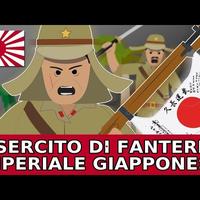La STORIA dell'esercito di fanteria IMPERIALE giapponese
||des Militärs||Infanterie|IMPERIAL|japanische
||of the army||infantry||Japanese
تاريخ جيش المشاة الإمبراطوري الياباني
Die GESCHICHTE der japanischen kaiserlichen Infanteriearmee
The HISTORY of the Japanese IMPERIAL infantry army
La HISTORIA del Ejército de Infantería IMPERIAL japonés
日本帝国歩兵軍の歴史
HISTORIA japońskiej imperialnej armii piechoty
A HISTÓRIA do Exército de Infantaria IMPERIAL Japonês
ИСТОРИЯ японской ИМПЕРИАЛЬНОЙ пехотной армии
HISTORIEN om den japanska IMPERIALA infanteriarmén
L'esercito di fanteria imperiale giapponese Seconda Guerra Mondiale
|||||Zweite|Krieg|Weltkrieg
The army|||||||World War
جيش المشاة الإمبراطوري الياباني في الحرب العالمية الثانية
I soldati giapponesi provenivano da diverse classi sociali,
|||stammten|||Klassen|sozialen Klassen
||Japanese soldiers|came|||classes|social classes
جاء الجنود اليابانيون من طبقات اجتماعية مختلفة،
Japanese soldiers came from different social classes,
come agricoltori, operai, insegnanti, impiegati, minatori e altre professioni.
wie|Landwirte|Arbeiter|Lehrer|Angestellte|Bergleute||and other|Berufe
|farmers||teachers|employees|miners|||professions
|||||mineiros|||
|||maestros|||||
كالمزارعين والعمال والمعلمين والكتبة وعمال المناجم وغيرهم من المهن.
Il governo giapponese introdusse la leva obbligatoria nel 1873, per ogni maschio in salute di 20
|Regierung||führte ein||Leistung|pflichtig|im||jeden|Mann||Gesundheit|von
|government||introduced||conscription|mandatory|||every|male||health|
||||||||||masculino|||
أدخلت الحكومة اليابانية التجنيد الإجباري في عام 1873، لكل 20 من الذكور الأصحاء
The Japanese government introduced compulsory conscription in 1873, for every healthy male of 20
anni e doveva prestare servizio per 3 anni.
|and|he had to||service||
سنوات وكان عليه أن يخدم لمدة 3 سنوات.
years and had to serve for 3 years.
Durante la guerra, quando la situazione iniziò a diventare critica,
||war||||began||to become|critical
أثناء الحرب، عندما بدأ الوضع يصبح حرجًا،
queste leggi vennero modificate al fine di rendere il reclutamento obbligatorio per tutti
these|laws|were|modified||||to make||recruitment|mandatory||
تم تغيير هذه القوانين لجعل التوظيف إلزاميًا للجميع
these laws were changed in order to make recruitment mandatory for all
i maschi di età superiore ai 20 anni.
الذكور فوق سن 20.
males over the age of 20.
L'addestramento consisteva in un duro processo di temperamento della mente, dello spirito
training|it consisted||||||tempering||||spirit
يتألف التدريب من عملية قاسية لتهدئة العقل والروح
The training consisted of a hard process of tempering the mind, the spirit
e del corpo.
Durante la guerra, la formazione poteva durare solo 3 mesi.
|||||it could|||months
خلال الحرب، يمكن أن يستمر التدريب لمدة 3 أشهر فقط.
During the war, the training could only last 3 months.
Particolare attenzione fu dalla alla lotta con la baionetta, per rievocare gli antichi
||it was|from the|||||bayonet||to evoke||
||||||||||evocar||
Particular attention was given to the fight with the bayonet, to evoke the ancients
guerrieri Samurai.
Samurai|Samurai
La baionetta è una versione moderna della spada samurai.
||it is|||||sword|
The bayonet is a modern version of the samurai sword.
I soldati giapponesi dovevano eseguire il loro dovere per l'Imperatore, considerato
||||perform|the||duty||the Emperor|
The Japanese soldiers had to perform their duty for the Emperor, considered
divino, e venivano trattati duramente dagli ufficiali, con percosse e una disciplina rigorosa.
divine||they came|||by the|officers||beatings||||rigorous
||||||||golpes||||
divine, and were treated harshly by officers, with beatings and strict discipline.
Durante l'invasione della Cina e la guerra del Pacifico contro gli Stati Uniti, le forze
britanniche, australiane e degli alleati, molti soldati giapponesi avrebbero mostrato
|Australian|||allies|||||shown
comportamenti fanatici e brutali contro il nemico, e anche verso i prigionieri di guerra
|fanatical||brutal||||||||prisoners||
fanatical and brutal behavior against the enemy, and also towards prisoners of war
e civili.
Le armi utilizzate dai Giapponesi durante il conflitto furono:
||||||||they were
Il fucile Arisaka Type 38 Il fucile Arisaka Type 99
|rifle|Arisaka|rifle||||rifle
Le mitragliatrici leggere Type 11, Type 99 Una baionetta, un cappello in tessuto e un
|machine guns|||||||hat||fabric||
||||||||sombrero||tela||
The Type 11, Type 99 light machine guns A bayonet, a cloth hat and a
elmo.
Elmo
Verso la fine della guerra, come nella battaglia di Saipan e la battaglia di Okinawa,
|||||||||Saipan|||||Okinawa
venivano incitati comportamenti come rifiutare di arrendersi e gli attacchi kamikaze al nemico.
they came|incited|||to refuse||to surrender||||kamikaze||
behaviors such as refusing to surrender and kamikaze attacks on the enemy were incited.
Questi ultimi erano noti come Banzai Charges - termine utilizzato dalle forze alleate.
|||||Banzai|charges|||||allied
The latter were known as Banzai Charges - a term used by the allied forces.
La tattica consisteva in un ultimo disperato tentativo offensivo, quando si stava perdendo
||||||desperate|||||you were|
The tactic consisted of one last desperate offensive attempt, when he was losing
la battaglia.
I soldati giapponesi avrebbero caricato il nemico urlando, "Tenno Heika BANZAI", che
|||they would|loaded||enemy|yelling|Emperor|Imperial||
|||||||gritando||||
The Japanese soldiers would charge the enemy screaming, "Tenno Heika BANZAI", that
significa "Lunga vita per l'Imperatore".
means "Long life for the Emperor".

